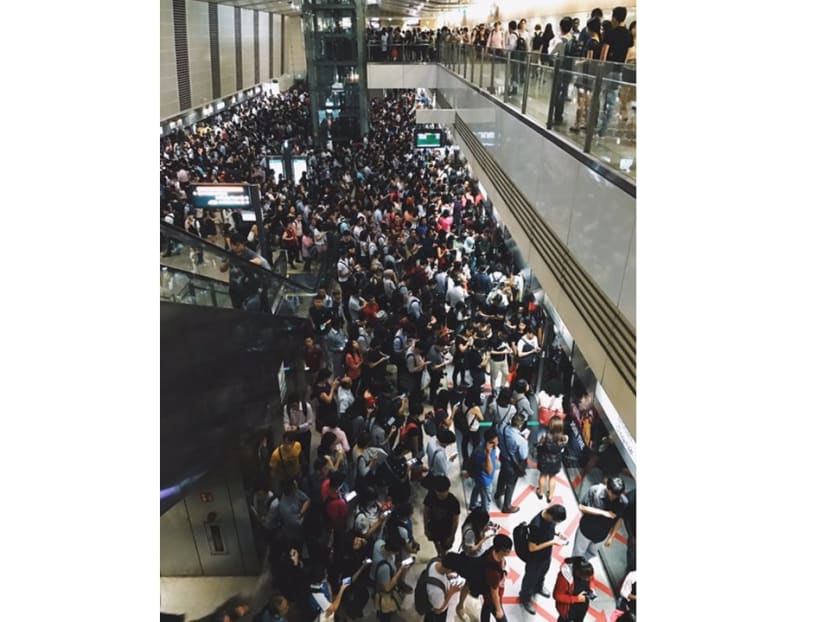Signal interference issue plagues Circle Line again
SINGAPORE — A signal interference problem that disrupted train services for five days in August and September returned on Wednesday (Nov 2) during the morning rush hour, leaving six Circle Line (CCL) stations, including major interchanges like Bishan and Serangoon, without train service.
SINGAPORE — A signal interference problem that disrupted train services for five days in August and September returned on Wednesday (Nov 2) during the morning rush hour, leaving six Circle Line (CCL) stations, including major interchanges like Bishan and Serangoon, without train service.
The interference caused loss of signal between trains and stations, forcing the trains to come to a stop. The Land Transport Authority (LTA) and SMRT on Wednesday said that preliminary investigations indicate that the nature of the faults in the latest incident could be similar.
With some trains down between stations, crowds began to build at the stations. SMRT staff had to make their way to the stalled trains to drive them to station platforms, while drivers had to be deployed on the usually-unmanned CCL trains during the evening rush hour as a precautionary measure.
The LTA and SMRT, which are unable to pinpoint the cause of the problem this time as well, are looking to suspend telecommunication signals along stretches of CCL, should signal interference occur again.
SMRT would not say how many commuters were affected by the disruption. The daily ridership of the CCL is 398,000 as of last May.
The signal fault was first announced at 7.37am, with SMRT saying over Twitter that there was a 10-minute delay between Pasir Panjang and one-north stations on the CCL. This escalated into delays on the whole line of up to 30 minutes.
At about 9.50am, SMRT announced on Twitter that service had halted at six stations, from the Botanic Gardens to Serangoon stations
Free bus services were provided at all CCL stations, and bus bridging services were activated between Bishan and Paya Lebar. Full service resumed at about 10.30am.
The disruption caused commuters like Ms Riyani, 30, to take 40 minutes to travel between the Buona Vista and Serangoon stations, double the usual time of 20 minutes.
Others were stuck for longer. Mr Sean Chew, 36 said: “I was stuck at Buona Vista for more than an hour. I didn’t want to take the bus because it was very crowded. So no choice, had to wait ... Luckily I just finished work.”
Some stuck on trains between stations took to social media to air their frustration. Facebook user Tasha Altez said she was on one such train for nearly half an hour, where ventilation system appeared to be down.
Commuter Shermaine Wong, 30, who was caught in the snarl at Paya Lebar MRT station, said the lack of announcements in languages other than English left commuters confused.
“Thankfully, I can read and speak English and I use a smartphone, but I pity the (elderly) who have no clue what was going on,” said the communications professional. “I saw people like lost sheep, pacing up and down with no MRT staff telling them where to wait.”
On Aug 29, persistent signal interference, which automatically activated the trains’ emergency brakes, had caused travel delays on the CCL. This went on for about five days, and for the first time, the LTA and SMRT had to suspend mobile signals at four stations as part of investigations.
Unable to determine the cause as the incidents subsequently stopped, both parties nonetheless announced it was looking into measures to boost the line’s signalling system, such as by installing spectrum analysers. TODAY understands a tender for the spectrum analysers will be called in due course.
On Wednesday, the LTA and SMRT said that should similar signalling faults recur, the LTA and SMRT will work with the Infocomm Media Development Authority and mobile network operators to suspend mobile signals along stretches of the CCL for short periods.
“If temporary telecommunication signal suspensions ha ve to be carried out, there will be in-train and station announcements along the affected stretches,” they said.
Apologising to commuters who were affected by the disruption on Wednesday, they added: “Should there be further signalling faults, free bus boarding and bus bridging will be activated, and we urge commuters to seek alternative routes to get to your destination. We seek commuters’ understanding as we work to resolve the issue as quickly as possible.” ADDITIONAL REPORTING BY CHRISTOPHER TOH AND KENNETH CHENG







